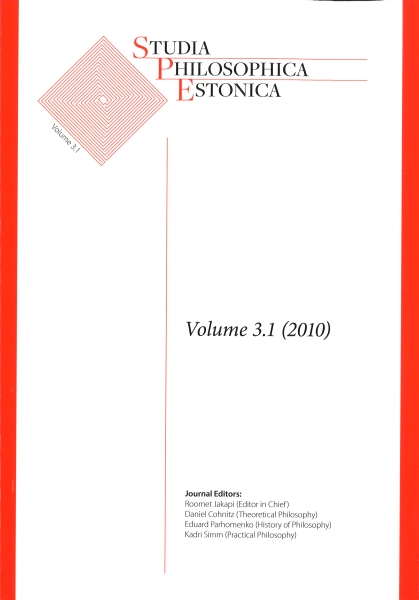Popper and Free Will
DOI:
https://doi.org/10.12697/spe.2010.3.1.02Keywords:
free will, free decision, determinism, indeterminism, intentional action, propensity, self-consciousnessAbstract
Determinism seems incompatible with free will. However, even indeterminism seems incompatible with free will, since it seems to make free actions random. Popper contends that free agents are not bound by physical laws, even indeterministic ones, and that undetermined actions are not random if they are influenced by abstract entities. I argue that Popper could strengthen his account by drawing upon his theories of propensities and of limited rationality; but that even then his account would not fully explain why free actions are not random. I offer a solution to this problem which draws on Hornsby's analysis of action. I then borrow an idea of Kant about self-consciousness to distinguish free agents from sub-human animals. I make a brief evaluation of Popper's contribution.
References
Anscombe, G. E. M. (1957). Intention, Basil Blackwell, Oxford.
Compton, A. H. (1935). The Freedom of Man, Yale University Press, New Haven.
Ekstrom, L. (2000). Free Will: A Philosophical Study, Westview Press, Boulder.
Hobart, R. E.(1998). Free will as involving determination and in conceivable without it, in P. van Inwagen and D. W. Zimmerman (eds), Metaphysics: The Big Questions, Blackwell, Oxford, pp. 343-355.
Hobbes, T. (1962). Leviathan, Fontana, Glasgow. John Plamenatz (ed.).
Hornsby, J. (1980). Actions, Routledge and Kegan Paul, London. Hume, D.(1975). Enquiries Concerning Human Understanding and Concerning the Principles of Morals, Clarendon Press. L. A. Selby-Bigge (ed.).
Kane, R. (1996). The Significance of Free Will, Oxford University Press, New York.
Kane, R. (2007). Libertarianism, in J. M. Fischer, R. Kane, D. Pereboomand M. Vargas Four Views on Free Will, Blackwell, Oxford, pp. 5-43.
Kant, I. (1898). The Critique of Practical Reason, Longmans, Green & co, London. trans. T. K. Abbot.
Kant, I. (1933). The Critique of Pure Reason, Macmillan Press,London. trans. N. Kemp Smith.
Mele, A. (1995). Autonomous Agents, Oxford University Press, Oxford.
Mele, A. (2001). Acting intentionally: Probing folk notions, in B. F. Malle, L. J. Moses and D. Baldwin (eds), Intentions and Intentionality: Foundations of Social Cognition, M. I. T. Press, Cambridge, MA, pp. 27-43.
Miller, D. W. (1994). Critical Rationalism, Open Court, Chicago.
Nozick, R. (1981). Philosophical Explanations, Harvard University Press, Cambridge, MA.
Popper, K. R. (1966). The Open Society and its Enemies, Vol. Routledge and Kegan Paul Ltd, London.
Popper, K. R. (1973). Of clouds and clocks, Objective Knowledge, Oxford University Press, Oxford, pp. 206-255.
Popper, K. R. (1982a). The Open Universe, Routledge, London.
Popper, K. R. (1982b). Quantum Theory and the Schism in Physics, Rowman and Littlefield, Totowa, NJ.
Popper, K. R. (1983). Realism and the Aim of Science, Routledge, London.
Popper, K. R. (1987). Natural selection and the emergence of mind, in G. Radnitzky and W. W. Bartley (eds), Evolutionary Epistemology, Rationality, and the Sociology of Knowledge, Open Court, La Salle, pp. 139-155.
Popper, K. R. (1990). A World of Propensities, Thoemmes, Bristol.
Popper, K. R. (1994). Knowledge and the Body-Mind Problem, Routledge, London.
Popper, K. R. and Eccles, J. C. (1977). The Self and its Brain, Springer-Verlag, London.
Reichenbach, H. (1956). The Direction of Time, University of California Press, Berkeley.
Russell, B. (1994). The elements of ethics, Philosophical Essays, Routledge, London, pp. 13-59.





